Looking back at the IM issue, the biggest issue was that there were too many competing systems to find your friends – some people were on AIM, some on Yahoo, some on ICQ, and there was this new thing called gTalk that was popping up. You could choose to have a few of your friends available by having one of the clients installed on your phone, or you could look at a number of “all the networks in one app” solutions to try and pull everything together.
IM is still not a unified environment (unlike a system such as email, where no matter the system, you can talk to anyone on the planet with an email address). Applications such as Nimbuzz ease the pain, but the whole “separate and unconnected islands” pretty much doomed IM as the next big thing, even though it still has uses.
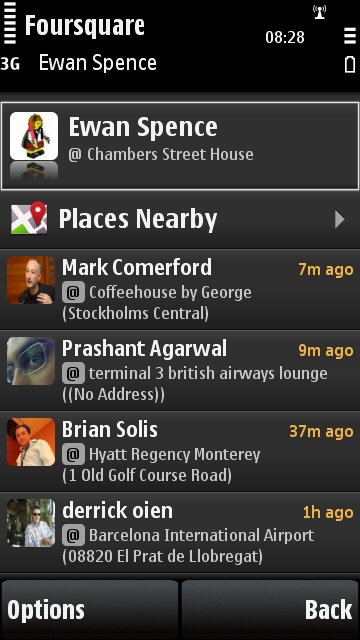
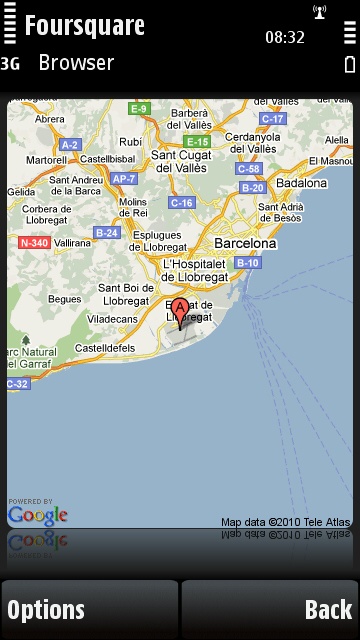
Checking in on Foursquare, via Gravity, which also offers Facebook and Twitter updates, just not at the same time.
With the rise of status messages and updates in the Web 2.0 world, with open API access to the data and the sharing of information between networks (in many cases automatically), this meant that there are less interoperability issues, and systems can flourish in partnership with each other, not instead of, as was the case with mobile IM.
Now look at the nascent world of geo-location in mobile.
When I turn up to a new location, what should I, as the tech-hipster be doing? Checking in to Foursquare; seeing if anyone has left an item or if a pin-badge is available on Gowalla; leaving a review on Yelp; wondering if there is a voucher on TellMeWhere; sending a picture of the location via Nokia Maps; finding my friends on Google Latitude; and probably a thousand more start-ups (Geodelic to name one) that think this location thing is a pretty neat idea.
Spotted the problem yet? That lot is going to take a good five or six minutes of browsing and client usage to check in. With no unified approach or central service that could share your location, or API’s and agreements between the services to allow the location data to be shared easily, you’re left with the choice of either trying to maintain everything (good luck with that), or choose a favourite network, perhaps with a second one for occasional use.
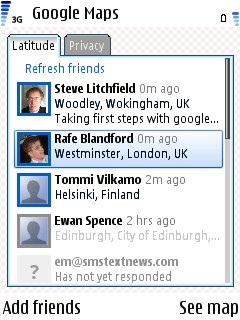
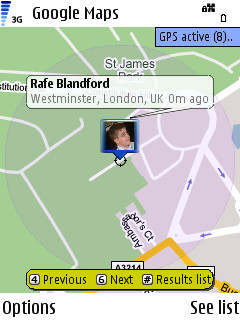
The incumbency advantage in geo-location services at the moment is huge. If you are using either of the “big” services (that would be Foursquare and Gowalla, feel free to discuss and pitch your ideas in the comments), it’s going to be very hard to switch to another service, even to try it out, because you’ll lose all the benefits of the service you are on, or spend more time doing multiple check-ins at the same location.
This “check-in fatigue” is going to be a growing problem as more companies find the location bandwagon to jump on. They’ll be faced with a choice of going it alone, or somehow integrating with an existing service. That puts Foursquare in a good place, but nobody else in the market.
Is this the right way forward for the location based check-in services? I’m making an implicit decision that the idea of saying where you are and having services that do interesting things with this information, is a good idea. I’ve seen how useful it can be when there is a density of people (volume, not IQ, calm down) at conferences such as SXSW Interactive – but many more people need to be using the services, services which are as easy and unobtrusive to use as possible. And that means banishing the millions of check-ins to countless services, because this is not the situation where only one service can be used standalone. The evolution of competition is sorely needed, but right now that competition is strangling the simple concept of check-in, through repetition.
Is this the right way? I don’t think so. What’s needed is a federated check-in service to be built, where you can update your location just the once, and this is fed out to all the other sites. Yes it would be a natural bottleneck and open to exploitation, but without something like this, I fear that a promising technology with many use cases is going to be sidelined in the minds of regular users.

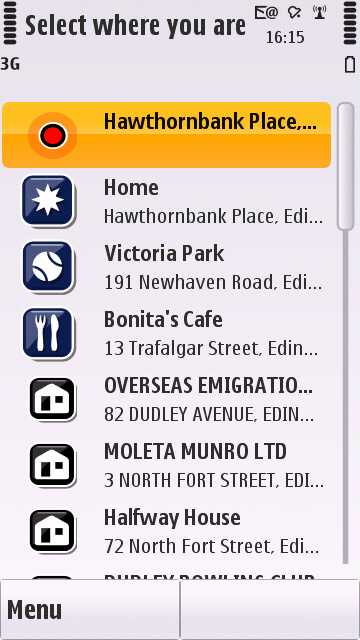
Getting from raw numbers offline to a nice online list needs to be as easy as possible
What needs to be avoided is one company becoming the only “first step” to passing out a location to all the services. Having a common standard to describe locations (both personal and named physical places) that could then be shared around other services would negate the commercial problem of the bottleneck, it would mean that the services could still advertise and compete to be seen as the site to use, but there would be no loss in trying out new services, leading to greater adoption of this class of service.
Because greater adoption is needed. For all the noise and PR that foursquare and their ilk can generate, their membership is tiny when compared to Facebook or Twitter. Plus you have the two elephants in the room – what happens when Google Maps and Ovi Maps start really exploiting a social layer? Latitude is still an experiment, and Share for Ovi Maps feels more like a test-bed than a finalised product. That’s a huge number of eyeballs and “here I am” messages flying around the world.
Should the geo-location companies ignore this business critical issue? Or should they be thinking of levelling the playing field through the aforementioned check-in sharing and aggregation? I’d argue the latter is needed as soon as possible.
Without some changes, geo-location is going to be another little footnote in smartphone history, a footnote that includes all the other interesting ideas that never really captured enough hearts and minds beyond a few hardcore power users and social web aficionados. At the moment it is too hard, too time consuming, and does not offer enough reward to become something that everyday people would do.
Luckily, there are solutions the industry could adopt – they’ve also got historical precedent (in IM) as to the likely result if they do nothing. The question now is will anyone do anything about it?
-- Ewan Spence, July 2010.
